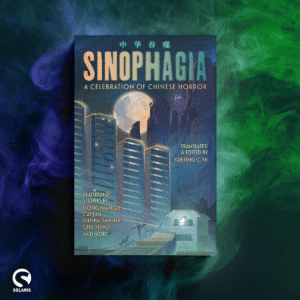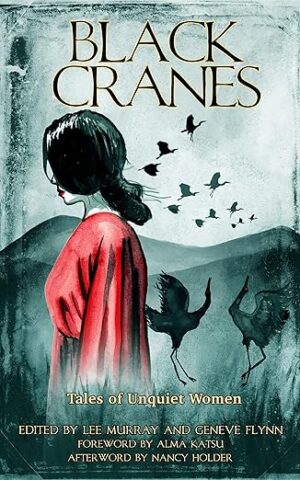Kari J. Wolfe, Member of the Diverse Works Inclusion Community
You can see any of The Seers’ Table posts since inception (March 2016) by going to the HWA main page and selecting the menu item “HWA Publications / Blogs / Seers’ Table”.
Kari J. Wolfe recommends:
 Katherine Silva is an ace Maine horror author, a connoisseur of coffee, and victim of cat shenanigans. Her favorite flavors of the genre mix grief and existentialism which she combines with her love of the New England wilderness in her works. She is a three-time Maine Literary Award finalist for speculative fiction. Katherine is also editor-in-chief of Strange Wilds Press.
Katherine Silva is an ace Maine horror author, a connoisseur of coffee, and victim of cat shenanigans. Her favorite flavors of the genre mix grief and existentialism which she combines with her love of the New England wilderness in her works. She is a three-time Maine Literary Award finalist for speculative fiction. Katherine is also editor-in-chief of Strange Wilds Press.
Her most recent novel, Where The Soul Goes, was recently released from Truborn Press.
Recommended Reading: Where The Soul Goes (Truborn Press)
1989: Floods and record rainfall have turned the United States into little more than a drowned world. People left and right lose their wills to live and are coming down with a degenerative disease called The Ash. It burns people up from the inside out, numbing the senses, erasing memories, turning people into nothing more than crumbling, shambling echoes of who they used to be.
Eliot Lamb, a once successful chef, is terrified when he discovers he has the Ash. Just when he thinks there is nothing left for him, he encounters Death in the form of his deceased protegee, Alexis. She has a proposition that might turn the tide against the Ash for the human race and he’s the only man for the job: find four people and change their lives. Inspire them. Eliot is skeptical but convinced only after a run-in with the FBI forces him out onto the road with a well-meaning plumber sidekick, Terry.
As they journey from flooded New England to the swamps of the American South and across the fog-saturated midwest, Eliot and Terry are pursued by an agent hell-bent on finding the source behind a string of domestic terrorist bombings that seem to be connected to the Ash and a man of the cloth convinced that Eliot is a devil in need of
cleansing. For Eliot, the road ahead gets murkier and murkier as the person he once was slips through his fingers with every bite he takes.
Inspired by Anthony Bourdain’s No Reservations and Simon Stalenhag’s dystopian tales, Where The Soul Goes explores the abyss of human connection through the culinary arts amidst an alternate 80’s backdrop.
 Excerpt from Chapter 1 of Where the Soul Goes:
Excerpt from Chapter 1 of Where the Soul Goes:
The team banters around him, ribbing each other, telling jokes. But the laughteris maudlin at best. It’s a solemn end to the last service they’ll ever give at Tempo, hisrestaurant. Everyone’s disappointment is like a radiator steadily warming the room.
Judging by Octave’s jocundity, he has another job lined up already. Maybe Justin has one, too. He didn’t bother to show up for his last day, to go down with the proverbialsinking of the ship. Move on, they tell you. Get started in a new routine. Eliot knowsJustin’s mother’s been sick off and on for a while. Poor kid can’t afford to stop.
Rose is still looking. She called him last Saturday after service. It was aroundmidnight, and he was waiting for the melatonin to kick in. It never did. She begged him not to close Tempo. Each hitch in her voice was like having someone squeeze staplesinto his back. Every time she tried to hold in her crying, it ratcheted up the helplessness in him. He wavered. For a millisecond, he fucking wavered. But, he couldn’t do anythingto help her; not then and not now. He can’t do anything to help himself so what makeshim think he can—
“…called The Agave Tap in Getty. Reports confirm at least forty-three casualties.Everyone in the building, including customers and kitchen staff, is assumed to have diedinstantly.”
His hand slips with the knife as he looks up at the TV. The picture on the screenis a blur of smoke and rubble.
God…
“El?” Meena sounds anxious but he can’t look away.
His breath has left him. Movement seems impossible. They’d said The AgaveTap, hadn’t they? He hadn’t misheard that. And everyone is dead? Dead.
“…True Faith have claimed responsibility. Mayor North issued a statement fromhis home that he is working with local law enforcement on new initiatives to flush outmembers…”
“Tave, grab the med kit!”
They’re showing footage of the blast, warning viewers of its graphic content. Eliotbarely recognizes the Agave Tap: the blue doors are nothing but splinters, the graffitiedyellow walls inside scored by explosion arcs and ash. Bits of charred meat and bloodspot the wreckage and stripe the fallen plaster. The network has tried to filter it as muchas they can, but the deed is done. Children will have nightmares from this. Parents will likely sue in spite of the caution.
Someone grabs his arm. There’s sudden pressure around his fingers. “Jesus! It’sdeep.”
For the first time, Eliot looks away and finds Meena clutching his hand, a ragwrapped around it. She’s pinched two fingers together and that’s when he finally noticesthe blood rolling down his palm.
Fuck. The rag is soaking through. His eyes drop on the knife, on the red-smearedlemon and the dark dribbles on the floor.
“What the hell happened? How did you not notice?” she asks.
He focuses on the lemons. He knows how. But he can’t tell her. “I wasdistracted.”
You can find out more about her work at katherinesilvaauthor.com.
Geneve Flynn recommends:
 Xueting C. Ni was born in Guangzhou, during China’s re-opening to the West. Having spent a childhoodliving in cities across China, she emigrated with her family to Britain, where shecontinued to beimmersed in Chinese culture, alongside her British education, realizing ultimately that this gave her aunique cultural perspective in bridging her Eastern and Western experiences. After graduating in EnglishLiterature from the University of London, and returning from Beijing where she studied ChineseLiterature, she began a career in the publishing industry, whilst creating works of non-fiction and literarytranslations. Since 2010, Xueting has writtenextensively on China’s cultures and its place in the Westernconsciousness, working withcompanies, institutions and festivals, to help improve understanding ofChina’s heritage andinnovations, and introduce its wonders to new audiences. In 2022, she undertookfurther studies to cement a decade of experience and research with an M.A. in Chinese Studies at SOAS.
Xueting C. Ni was born in Guangzhou, during China’s re-opening to the West. Having spent a childhoodliving in cities across China, she emigrated with her family to Britain, where shecontinued to beimmersed in Chinese culture, alongside her British education, realizing ultimately that this gave her aunique cultural perspective in bridging her Eastern and Western experiences. After graduating in EnglishLiterature from the University of London, and returning from Beijing where she studied ChineseLiterature, she began a career in the publishing industry, whilst creating works of non-fiction and literarytranslations. Since 2010, Xueting has writtenextensively on China’s cultures and its place in the Westernconsciousness, working withcompanies, institutions and festivals, to help improve understanding ofChina’s heritage andinnovations, and introduce its wonders to new audiences. In 2022, she undertookfurther studies to cement a decade of experience and research with an M.A. in Chinese Studies at SOAS.
Xueting has contributed to the BBC, Tordotcom and the Confucius Institute. Her non-fiction worksinclude From Kuanyin to Chairman Mao: An Essential Guide to Chinese Deities (Weiser Books), Chinese Myths (Amber Books). Her curated fiction in translation includes Sinopticon: A Celebration of Chinese Science Fiction (Solaris) and Sinophagia: A Celebration of Chinese Horror. Xueting is currently workingon a range of projects, including a new anthology on China and a book on wuxia culture. She lives just outside London with her partner and their cats, all of whom are learning Mandarin.
Recommended Reading:Sinophagia: A Celebration of Chinese Horror
Excerpt from Sinophagia: A Celebration of Chinese Horror:
 Chinese society is such a broad and diverse group, with regional concerns and habits usually hidden away in front of a Western audience, to show a unified “Chineseness”. But here you will see theurban fear of the rural, the rural fear of the urban, the traditional fear of modern living, and ModernChina’s fear of its past.
Chinese society is such a broad and diverse group, with regional concerns and habits usually hidden away in front of a Western audience, to show a unified “Chineseness”. But here you will see theurban fear of the rural, the rural fear of the urban, the traditional fear of modern living, and ModernChina’s fear of its past.
So much of China is still wild land, from mountainous regions and forests to wide barren deserts,and so much of the supernatural thoughts of China surround the ghosts, spirits and monsters that seem toinhabit these places. In fact, there is certainly an idea that Chinese Horror is overwhelmingly rural, butwith Chinese society becoming more urbanised, I knew there were some excellent horror storiesinspiredby urban legends, and based on social sources, and I made a consolidated effort to include those…Horror traditions are intensely regional, with strong emotional energies, such as fear, very muchembedded in our natural and manmade surroundings. Sinophagia reflects a society still dealing with recent histories of war, invasions, and revolutions, who still have a deep-rooted connection to a land thathas not always been hospitable, and a cultural memory of the dangers brought by floods, famine, and the inhospitable terrain which surrounds the flatter cradle of early civilisation….
…You may think that you are going to read this book, and when you finish the last page, you willcalmly put it down and get on with your lives, but I hope that as the curator of this collection, it willchange you a little along the way. Whether it’s a moment’s hesitation before you step out on the balcony,or the speed with which you slam the book down after the last twist, I hope that some of it will stay withyou for a very, very long time.
Review for Sinophagia: A Celebration of Chinese Horror:
“…this book should be required reading for folks involved in the speculative short fiction industry…”—Lightspeed Magazine; “Book Review: Sinophagia, edited and translated by Xueting Christine Ni,” byArley Sorg.
Follow Xueting Christine Ni at:
Website: snowpavilion.co.uk
Bluesky xuetingni@bsky.social
Instagram @SnowPavilion
Author photo credit: The Factory
Linda D. Addison recommends:
 Wendy Dalrymple loves to explore the beauty in horrific things. She is a Florida-based author of feminist #pinkhorror, gothic and romance novels and has had her work published by a number of small presses including Quill & Crow and Mad Axe Media. She is the author of Birthday Party Demon, a nostalgic YA novella, as well as Credenza, a Florida gothic novel. Her upcoming pink horror novel,Bed Rot Baby, explores themes of self-image and body horror through the lens of the early 21st century, and her upcoming slasher novel Killer Summer is a nostalgic ode to her favorite teen horror films.
Wendy Dalrymple loves to explore the beauty in horrific things. She is a Florida-based author of feminist #pinkhorror, gothic and romance novels and has had her work published by a number of small presses including Quill & Crow and Mad Axe Media. She is the author of Birthday Party Demon, a nostalgic YA novella, as well as Credenza, a Florida gothic novel. Her upcoming pink horror novel,Bed Rot Baby, explores themes of self-image and body horror through the lens of the early 21st century, and her upcoming slasher novel Killer Summer is a nostalgic ode to her favorite teen horror films.
Recommended Reading: Credenza (Quill & Crow Publishing House, June 17, 2025)
Whether it’s renovating her home, running her online boutique, or taking care of herdaughter, Veronica Marquette is no stranger to handling things on her own. So when herbeloved Grandma Maddie passes away, she thinks nothing of hauling her cherished credenzahome herself. But with the arrival of the peculiar piece of furniture, old family secrets alsoemerge. Veronica is confronted by an ancient enemy who has come to claim a lost relic thatrepresents much more than she could have ever imagined.
Excerpt from the prologue of Credenza:
 “Cut it down.”
“Cut it down.”
The wind whipped at Peter’s back in sharp, cruel gusts that cut through his threadbare coat straight to the bone. The ax handle was heavy in his hands as he stared at the stranger with uncertainty under a moonless night sky. Overhead, the naked branches of the twisted old walnut tree shivered in the breeze.
“The old Burgemeester tree?” Peter asked. “But, sir. The old mothers in town… They say not to—”
“Do as I tell you, boy!”
The back of the man’s hand met the side of Peter’s face with a shocking sting.
Peter gasped but was too afraid to say anything more. At dusk, the man in the scarlet cloak had plucked him from his nearby farm while splitting wood. The man had an accent Peter did not recognize and dark, refined features that seemed out of place for his village. Though his first instinct had been to run, he listened to the man’s unusual task. It had been an unusually cruel winter for the family, and Peter couldn’t say no to the promise of silver, even from a stranger.
“Do it now!”
The unearthly tone in the man’s voice caused the milk Peter had consumed at dinner to curdle in his guts. Trembling with weak knees and a bruised cheek, Peter wished he had listened to his instincts.
He pushed past his fear, gripped the ax handle, and swung. He knew the consequences of cutting down the tree—of disturbing the resting place of the most wicked of men. He had spent many a dark night as a child at his grandmother’s feet, listening to her tales of warning and woe by the fire. Still, with the menacing man at his back and the promise of a much-needed payment clawing at his mind, Peter felt he had no other choice. He gritted his teeth and swung.
The ax blade planted into the trunk of the tree with more difficulty than he expected. One chop. Two chops. Three. Peter was skilled when it came to felling trees, but walnut was a particularly hardy wood. He was cold and frightened, but as he plunged his blade into the trunk for the fourth time, his fear crystallized into pure terror. A gush of red spilled forth from the wound Peter had created with his ax. Bright and steaming, the crimson fluid splashed out onto the snow, filling Peter’s nostrils with the metallic tang of blood. He gasped again and jumped back as it splashed his boots.
Follow her website: https://wendydalrymple.com/ ; everywhere else: @wendydalrymplewrites
Kate Maruyama Recommends:
 Gabriela Lee teaches creative writing and children’s literature at the Department of English & Comparative Literature at the University of the Philippines, Diliman. She is the author of the short story collections Instructions on How to Disappear (Visprint, 2016) and A Playlist for the End of the World (UP Press, 2022); the latter was nominated for a National Book Award for Fiction in English in 2023. She received the 2019 PBBY-Salanga Grand Prize for her children’s book, which was published as Cely’s Crocodile: The Story and Art of Araceli Limcaco-Dans (Tahanan Books, 2020). She is the co-editor of Mapping New Stars: A Sourcebook on Philippine Speculative Fiction (UP Press, 2024) along with Anna Felicia Sanchez and Sydney Paige Guerrero. Her scholarly work has been published in recent journal issues of the Children’s Literature Association Quarterly and The Lion and the Unicorn.
Gabriela Lee teaches creative writing and children’s literature at the Department of English & Comparative Literature at the University of the Philippines, Diliman. She is the author of the short story collections Instructions on How to Disappear (Visprint, 2016) and A Playlist for the End of the World (UP Press, 2022); the latter was nominated for a National Book Award for Fiction in English in 2023. She received the 2019 PBBY-Salanga Grand Prize for her children’s book, which was published as Cely’s Crocodile: The Story and Art of Araceli Limcaco-Dans (Tahanan Books, 2020). She is the co-editor of Mapping New Stars: A Sourcebook on Philippine Speculative Fiction (UP Press, 2024) along with Anna Felicia Sanchez and Sydney Paige Guerrero. Her scholarly work has been published in recent journal issues of the Children’s Literature Association Quarterly and The Lion and the Unicorn.
She is currently a PhD candidate in the English Department at the University of Pittsburgh.
Excerpt: “Rites of Passage” from the Stoker Award Winning Anthology Black Cranes: Tales of Unquiet Women
 She will push. Sweat will mat her hair against her forehead and the nape of her neck, her legs braced apart as though she contains the entire world between them, her body contorting against the creature inside her forcing its way out. She will feel sharp, tiny teeth nipping through her flesh, the small nub of a tongue tasting her blood. She will realize that it is trying to anchor anchor itself to her, to find a path back home, and in the horror of that realization, she will push one last time in an effort to expel the creature from her body. She will feel herself deflating, slickness coating her legs as her body ejects the afterbirth, and for a moment, her head will hang backward in relief. And then she will meet the eyes of a small child, already steady on its legs, its bare skin stained with the dark, scarlet-black blood of its former home, looking at her with shadowed eyes and a sharp smile. It will hold its cord and afterbirth in one hand, and before she can look away, it will tear into the plump sac with its teeth, efficiently devouring it in two bites, before showing her its bloodstained fangs. Then it will smile at her and walk silently into the trees. In the distance, in the spaces between the trees, she will see the shape of a woman, opening its arms in welcome. The debt is paid.
She will push. Sweat will mat her hair against her forehead and the nape of her neck, her legs braced apart as though she contains the entire world between them, her body contorting against the creature inside her forcing its way out. She will feel sharp, tiny teeth nipping through her flesh, the small nub of a tongue tasting her blood. She will realize that it is trying to anchor anchor itself to her, to find a path back home, and in the horror of that realization, she will push one last time in an effort to expel the creature from her body. She will feel herself deflating, slickness coating her legs as her body ejects the afterbirth, and for a moment, her head will hang backward in relief. And then she will meet the eyes of a small child, already steady on its legs, its bare skin stained with the dark, scarlet-black blood of its former home, looking at her with shadowed eyes and a sharp smile. It will hold its cord and afterbirth in one hand, and before she can look away, it will tear into the plump sac with its teeth, efficiently devouring it in two bites, before showing her its bloodstained fangs. Then it will smile at her and walk silently into the trees. In the distance, in the spaces between the trees, she will see the shape of a woman, opening its arms in welcome. The debt is paid.
Lee can be found on various social media under the online name @sundialgirl
###

